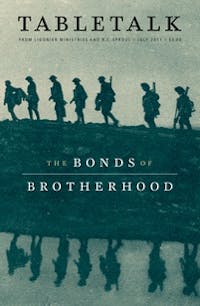
Request your free, three-month trial to Tabletalk magazine. You’ll receive the print issue monthly and gain immediate digital access to decades of archives. This trial is risk-free. No credit card required.
Try Tabletalk NowAlready receive Tabletalk magazine every month?
Verify your email address to gain unlimited access.
Paul the apostle wrote to the Romans, encouraging them to “present your bodies as a living sacrifice, holy and acceptable to God, which is your spiritual worship” (12:1). The notion of sacrifice may seem foreign to our contemporary ears today, but it certainly would not have been so during the first century when the apostle penned these words. In fact, the image of sacrifice was implicit in just about everyone’s understanding of worship in antiquity. It makes perfect sense, therefore, for Paul to exhort his readers to spiritual worship using the imagery of sacrifice.
I’ll take this a step further and suggest that offering sacrifice was the very purpose for which man was created in the first place. As many Old Testament scholars — both Jewish and Christian — have suggested, the creation narrative in the book of Genesis describes the formation of the heavens and earth in terms of the creation of a cosmic temple with Eden as its inner sanctuary. If such is the case, then questions arise. What are temples for? What practice are they designed to facilitate? The answer is obvious. Temples exist in order for sacrifices to be offered within them. This gives rise to a further question. What kind of person is ordained to offer sacrifice? Again, it is obvious: sacrifice can only be offered by a priest. Thus in his original role in creation, Adam was given not only the kingly role of exercising dominion over creation but also the priestly role of offering himself back to his Creator in sacrificial, self-giving love. His fall into sin, however, represented his failure to fulfill the destiny for which he was originally created. Thus, Adam the primeval priest became desecrated and defiled, unfit to offer sacrifice.
Enter the Lord Jesus Christ, whose mission consisted of undoing the work of the first Adam and accomplishing for us what Adam failed to do. Thus, Jesus described his own work and ministry in sacrificial terms: “The Son of Man came not to be served but to serve, and to give his life as a ransom for many” (Matt. 20:28). Paul described his work similarly: “Walk in love, as Christ loved us and gave himself up for us, a fragrant offering and sacrifice to God” (Eph. 5:2).
But with all of our talk in Reformed circles about the sufficiency of Christ’s atoning work, is it possible that we have failed to recognize the ongoing relevance of that once-for-all sacrifice? While it is true that the cross secures our eternal redemption, it is also true that the significance of Jesus’ sacrificial death was not exhausted on Good Friday, nor has the cross had its full effect when the sinner embraces it and receives forgiveness of sins. Instead, Jesus teaches that the sacrifice of the cross is to shape our lives every single day:
And he said to all, “If anyone would come after me, let him deny himself and take up his cross daily and follow me. For whoever would save his life will lose it, but whoever loses his life for my sake will save it.” (Luke 9:23–24)
Personally, I am becoming more and more convinced that the ethic of the new covenant can only be understood when considered through sacrificial lenses. If Christ-likeness means anything at all, it means that we who would follow Him are called to deny ourselves (hardly a groundbreaking thought, I know). Taking this further, our self-denial should extend even to the point of voluntarily refraining from our enjoyment of legitimate blessings to which we may be entitled. Paul himself demonstrated this sacrificial ethic. He told the Corinthians that as an apostle he had the right to marry and travel with a wife (a privilege that other apostles took advantage of), however, he willingly chose not to do so for the sake of his gospel ministry. Likewise, though Paul was entitled to a salary for his labor for Christ, he voluntarily forfeited any financial claim so as not to hinder the advance of God’s kingdom (1 Cor. 9:1–12).
This sacrificial ethic is utterly foreign to many Americans, especially when we are taught from an early age to stand up for ourselves, to take what is ours, and to fight for our rights. We’re just not used to turning the other cheek, going the extra mile, or giving away our tunic along with our cloak (Matt. 5:39–41). But if the Son of God, the second person of the Holy Trinity, had “inalienable rights” that He chose not to exercise out of love for His Father and us, and if He then calls us to take up our crosses and follow Him, who are we to expect better treatment than He received at the hands of this world?
If our original father was created with a priestly, sacrificial goal in mind, and if Jesus is the last Adam, then it follows that it is in Christ that this sacrificial goal is fulfilled. This fulfillment takes place for us upon the cross of Calvary and then through us as we bear our own crosses in this passing age.
